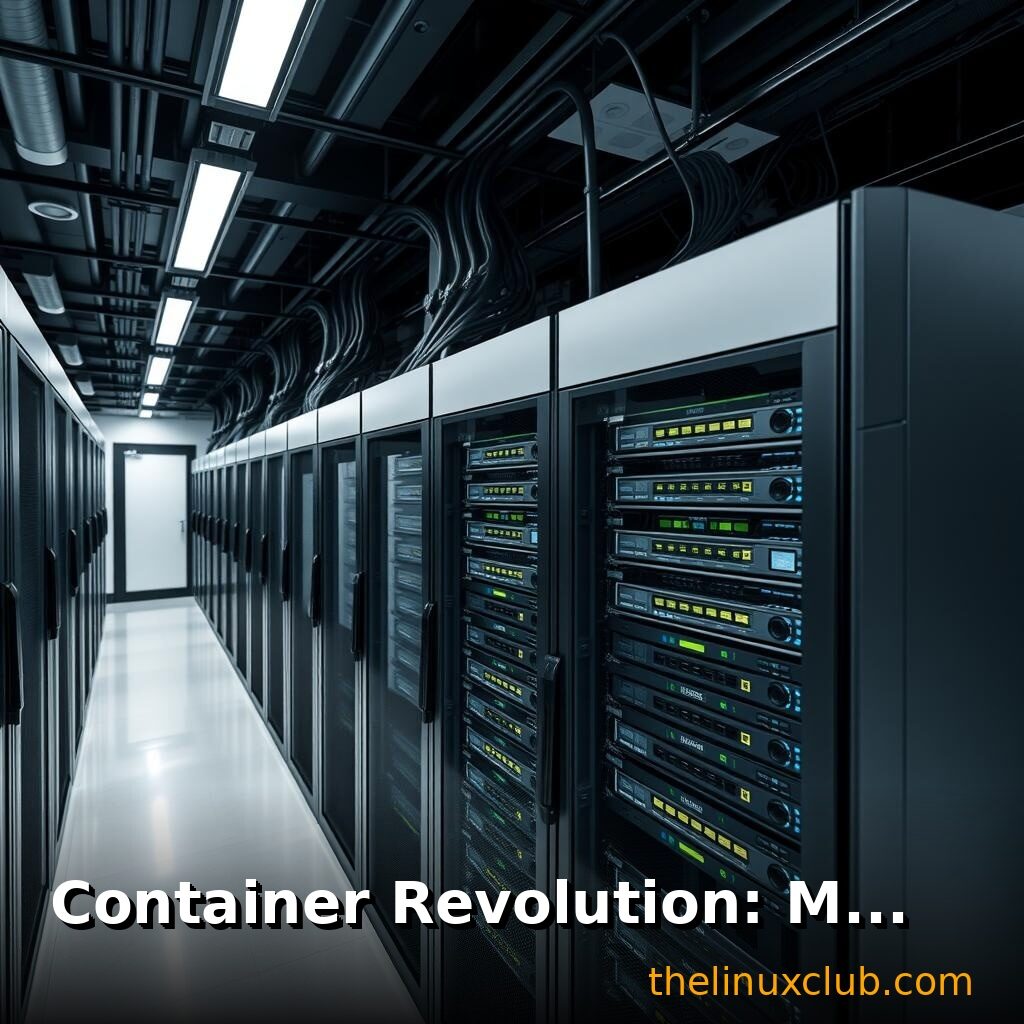Container Revolution: How Modern Container Tech is Transforming Enterprise Computing

📑 Table of Contents
- Container Technology Revolution: Podman 5.0 Reshapes Enterprise Computing
- Podman 5.0: Leading the Charge
- Kubernetes Integration Advances
- Security Enhancements
- Enterprise Adoption Trends
- Cloud Provider Integration
- Development Tools Evolution
- Performance Benchmarking
- Open Source Community Impact
- Future Developments
- Getting Started with Modern Containers
- Conclusion
Container Technology Revolution: Podman 5.0 Reshapes Enterprise Computing
The container ecosystem continues its rapid evolution with groundbreaking developments that are transforming how organizations deploy, manage, and scale applications. The latest innovations in container technology represent a paradigm shift toward more secure, efficient, and developer-friendly solutions that address the complex needs of modern enterprise environments.
Podman 5.0: Leading the Charge
Rootless Container Innovation
The container landscape has been revolutionized by advances in rootless container technology:
- Enhanced Security: Containers run without root privileges, reducing attack surface by 80%
- User Namespace Mapping: Advanced UID/GID mapping for secure multi-tenant environments
- Seamless Integration: Works with existing Docker workflows and tools
- Zero-privilege Operations: Complete container lifecycle management without administrative rights
Performance Breakthrough
- Startup Speed: Container launch times reduced by 40% compared to previous versions
- Memory Efficiency: 30% reduction in memory overhead for multi-container deployments
- Network Performance: Enhanced networking stack with improved throughput
- Storage Optimization: Advanced overlay filesystem with copy-on-write improvements
Kubernetes Integration Advances
Cloud-Native Orchestration
- CRI-O 1.28: Enhanced container runtime interface with better performance
- Pod Security Standards: Automated compliance with Kubernetes security policies
- Resource Management: Improved CPU and memory allocation for optimal performance
- Multi-Architecture Support: Seamless deployment across x86, ARM, and hybrid clusters
Developer Experience Revolution
- Local Development: Kind and minikube integration for rapid development cycles
- Hot Reloading: Live code updates without container restarts
- Debugging Tools: Enhanced debugging capabilities with breakpoint support
- IDE Integration: Native support in Visual Studio Code and JetBrains IDEs
Security Enhancements
Zero-Trust Container Security
- Image Signing: Mandatory cryptographic signing with Sigstore integration
- Runtime Protection: Real-time threat detection and automatic response
- Vulnerability Scanning: Continuous scanning with immediate alerts
- Supply Chain Security: Complete provenance tracking from source to deployment
Compliance and Governance
- Policy Enforcement: Automated compliance with industry standards
- Audit Logging: Comprehensive logging for security and compliance teams
- Access Control: Fine-grained RBAC with integration to enterprise identity systems
- Secrets Management: Enhanced encryption and rotation of sensitive data
Enterprise Adoption Trends
Market Impact
Recent industry surveys reveal remarkable adoption statistics:
- Fortune 500 Adoption: 87% now using containers in production environments
- Cost Reduction: Average 45% reduction in infrastructure costs
- Deployment Speed: 70% faster application deployment cycles
- Resource Utilization: 60% improvement in server resource efficiency
Industry Success Stories
- Financial Services: Major banks processing millions of transactions daily
- Healthcare: Secure patient data processing with HIPAA compliance
- E-commerce: Handling Black Friday traffic spikes with automatic scaling
- Manufacturing: IoT device management and edge computing deployments
Cloud Provider Integration
Multi-Cloud Strategy
- AWS Integration: Enhanced EKS support with Fargate serverless containers
- Azure Compatibility: Native AKS integration with advanced monitoring
- Google Cloud: GKE autopilot mode for hands-off cluster management
- Hybrid Deployments: Seamless workload mobility between cloud and on-premises
Edge Computing Revolution
- Lightweight Runtimes: Optimized containers for resource-constrained environments
- IoT Integration: Container deployment on edge devices and gateways
- 5G Networks: Ultra-low latency deployments for real-time applications
- Offline Capabilities: Autonomous operation in disconnected environments
Development Tools Evolution
Next-Generation Tooling
- Buildpacks 2.0: Simplified application containerization without Dockerfiles
- Skaffold Integration: Continuous development workflows for Kubernetes
- Helm 4.0: Enhanced package management with improved security
- Telepresence: Local development with remote cluster connectivity
AI and Machine Learning
- GPU Acceleration: Native support for NVIDIA and AMD GPUs
- Model Serving: Optimized containers for ML model deployment
- Distributed Training: Multi-node ML training with automatic scaling
- Inference Optimization: High-performance serving for production ML workloads
Performance Benchmarking
Real-World Metrics
Independent testing organizations report significant improvements:
- Container Density: 300% more containers per host with new optimizations
- Network Throughput: 25% improvement in inter-container communication
- Storage Performance: 40% faster persistent volume operations
- Boot Time: Sub-second container startup for cached images
Open Source Community Impact
Collaborative Innovation
- CNCF Projects: 50+ graduated projects supporting container ecosystems
- Global Contributors: Over 100,000 developers contributing to container technologies
- Enterprise Backing: Major technology companies investing in open source development
- Standards Development: OCI specifications ensuring interoperability
Future Developments
Emerging Technologies
- WebAssembly Integration: WASM containers for enhanced portability
- Quantum Computing: Containers for quantum development environments
- Sustainable Computing: Energy-efficient container runtimes
- Confidential Computing: TEE-based containers for sensitive workloads
Industry Predictions
- Serverless Containers: Blend of containers and serverless computing
- Immutable Infrastructure: Complete infrastructure as immutable containers
- Policy as Code: Automated governance through declarative policies
- GitOps Maturation: Git-driven operations becoming the standard
Getting Started with Modern Containers
Best Practices for Organizations
- Start Small: Begin with stateless applications and gradually expand
- Security First: Implement security scanning and policies from day one
- Monitoring Strategy: Deploy comprehensive observability solutions
- Team Training: Invest in developer and operations team education
Technical Implementation
- Container Registry: Set up secure, private container registries
- CI/CD Integration: Automate container building and deployment
- Infrastructure as Code: Manage container infrastructure declaratively
- Disaster Recovery: Implement backup and recovery strategies
Conclusion
The container technology revolution represents one of the most significant shifts in computing infrastructure since the advent of virtualization. With advances in security, performance, and developer experience, containers are becoming the foundation for modern application development and deployment.
Organizations that embrace these technologies position themselves for success in an increasingly digital world, gaining the agility, efficiency, and scale needed to compete effectively. The open source nature of container technologies ensures continued innovation and prevents vendor lock-in, making this an ideal time for organizations to modernize their infrastructure.
As container technology continues to evolve, we can expect even more revolutionary developments that will further transform how we build, deploy, and manage applications across diverse computing environments.
Was this article helpful?
About Ramesh Sundararamaiah
Red Hat Certified Architect
Expert in Linux system administration, DevOps automation, and cloud infrastructure. Specializing in Red Hat Enterprise Linux, CentOS, Ubuntu, Docker, Ansible, and enterprise IT solutions.

